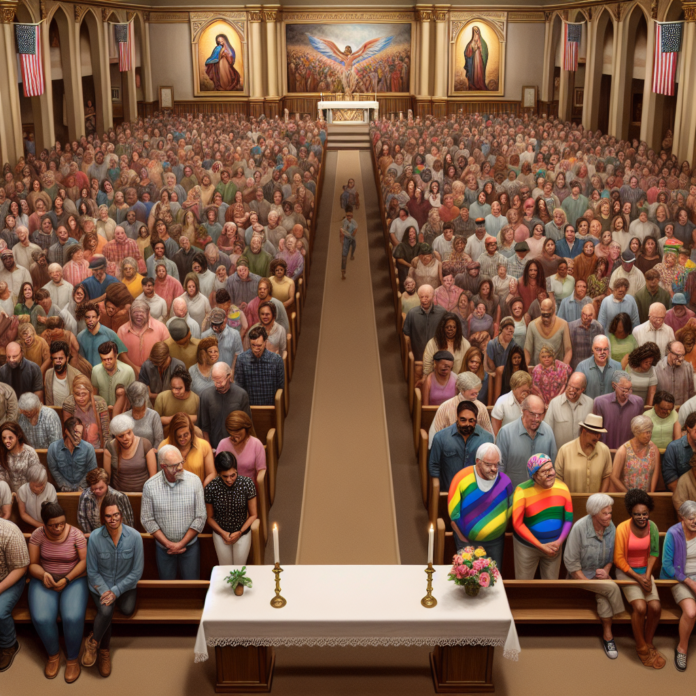Title: A New Dawn: Embracing LGBTQ+ Inclusion in the American Catholic Church
In the hushed corridors of American Catholicism, a quiet yet tenacious movement is percolating—a movement toward inclusivity, understanding, and compassion for the LGBTQ+ community. The American Catholic Church, steeped in centuries-old tradition, finds itself at a critical juncture in its history. While traditionalists advocate for the preservation of longstanding customs, a more progressive faction, inspired by the pastoral leadership of Pope Francis, urges the Church to embrace a future that celebrates diversity and unconditional love.
Historically, the Catholic Church’s relationship with the LGBTQ+ community has been fraught with tension. The doctrines derived from centuries-old interpretations of biblical texts have often been wielded as obdurate barriers against accepting those whose identities and loves diverge from traditionally heteronormative ideals. The Latin Mass, characterized by its rigid adherence to past liturgical practices and often associated with conservative values, frequently symbolizes this resistance to change. Its preservation of antiquated customs often neglects the voices advocating for a more inclusive Church, inadvertently widening the chasm between doctrine and empathy.
Yet, underneath this veneer of tradition, a shift is occurring. The ascendancy of Pope Francis—a pontiff who has consistently advocated for mercy over judgment—heralds a pivotal moment for the Church. His papacy is marked by an inclusive ethos, most notably encapsulated in his oft-quoted phrase, “Who am I to judge?” when referring to gay individuals. This simple yet profound sentiment has resonated powerfully across the globe, offering hope to many who have long felt marginalized within the Church.
This shifting tide has emboldened many American Catholics to call for a more inclusive Church that aligns more closely with the progressive values of love, compassion, and acceptance. While some dioceses remain steadfast in their adherence to traditionalist views, an increasing number of parishes have begun opening their doors wider to welcome LGBTQ+ congregants. These communities strive to create spaces where love and acceptance are not only preached but also practiced.
This movement is not without its challenges. Those who champion LGBTQ+ inclusion in the Church often face fierce opposition from conservative factions that view such efforts as anathema to the core tenets of Catholicism. These traditionalists assert that accommodating LGBTQ+ identities threatens to undermine the Church’s teachings on marriage and family. However, such views seemingly overlook the core message of the Gospel: love, compassion, and the inherent dignity of every human being.
Progressive Catholics argue that by fostering a dialogue centered around inclusivity and understanding, the Church not only honors its spiritual and moral obligations but also reinvigorates its mission in the modern world. They point to historical instances where the Church has evolved its stances in response to shifting societal norms. For instance, the Church’s eventual acknowledgment of the legitimacy of scientific findings in the wake of the Galileo affair, or its stance on usury, exemplifies its capacity for growth and adaptation.
Moreover, the ethical obligation of the Church to address social injustices and promote human dignity aligns with the principles of LGBTQ+ inclusion. The Catholic Social Teaching upholds the sanctity of life and emphasizes human dignity, a cornerstone argument advocating for the Church to extend its embrace to all individuals, irrespective of their sexual orientation or gender identity. By eschewing antiquated prejudices, the Church has the opportunity to reaffirm its commitment to these timeless principles.
The discourse surrounding LGBTQ+ inclusion in the Church brings to light an essential question: what kind of Church do we aspire it to be in this era? A Church that clings fiercely to traditions that may no longer resonate with its congregation, or a Church that courageously evolves to mirror the compassionate and inclusive spirit of Christ? The progressive movement, led in part by the compassionate vision of Pope Francis, urges for the latter—a Church that welcomes all its faithful with open arms, recognizing their contributions, celebrating their identities, and valuing their dignity.
While the path toward full acceptance and inclusion within the American Catholic Church remains fraught with challenges, the persistence of those who advocate for a more loving and inclusive Church signifies hope. The growing acceptance of LGBTQ+ individuals within Catholic communities illuminates a future where the Church is not merely a custodian of age-old traditions but a vibrant, compassionate community of believers.
As this movement continues to gain momentum, it nudges the Church closer to embodying its foundational teachings of love, understanding, and compassion. It is a reminder, as we look toward the horizon, that in love there is strength, in acceptance there is unity, and in inclusion, there is renewal. In embracing these values, the Church stands poised to enter a new era of faith—a faith that transcends the boundaries of tradition to celebrate the divine diversity of all its believers.
